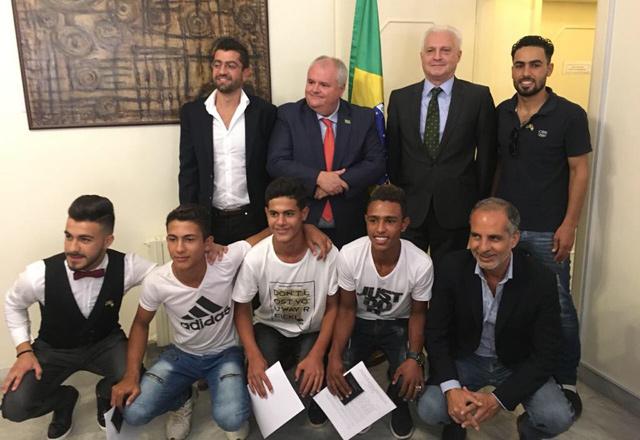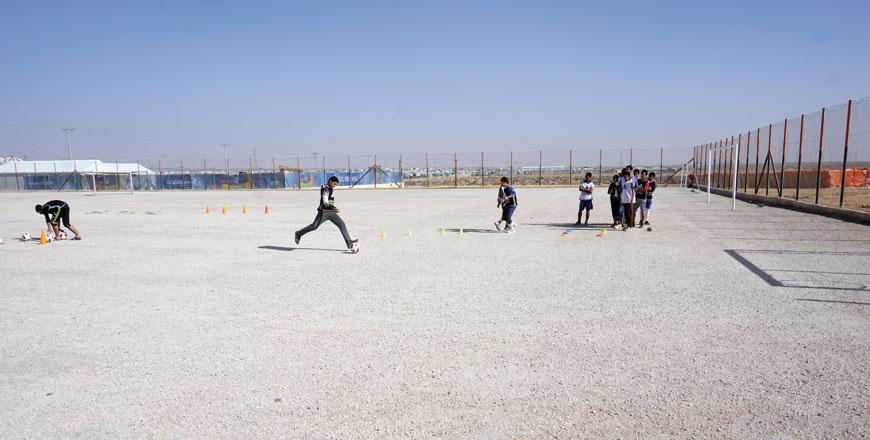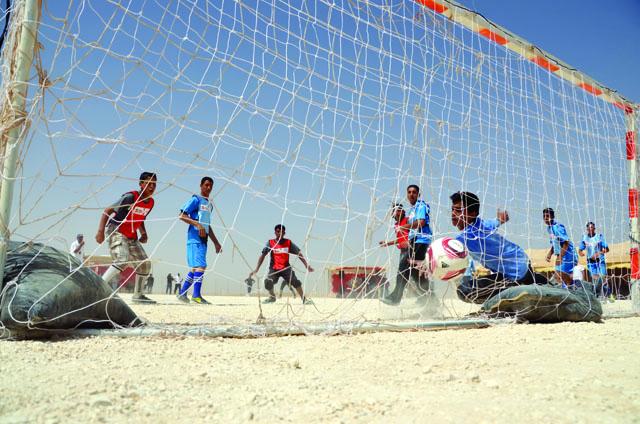You are here
Becoming football players in Brazil, Syrian youth to train at Rio academy
By Camille Dupire - Aug 20,2018 - Last updated at Aug 20,2018

Brazilian Ambassador to Jordan Francisco Carlos Soares Luz pose for a group photo with young Syrian refugees at the embassy on Sunday (Photo by Camille Dupire)
AMMAN — Five young Syrian refugees have been given the chance to pursue the world’s most sought-after career — football — in Brazil as part of the Black Pearls Football Academy programme.
The one-year football training programme was developed through the joint efforts of the Brazilian embassy in Amman, UNHCR, Prince Ali Foundation Asian Football Development Project (AFDP) and the Brazilian NGO Viva Rio.
Visa to new life
“We are today gathered to celebrate the granting of the Brazilian visas to these five talented youth, who will now embark on their journey to the great world of Brazilian football,” said Viva Rio project manager, Hashem Sabbagh, at the launch ceremony held at the Brazilian embassy on Sunday.
Alongside their families and in the presence of Brazilian Ambassador to Jordan Francisco Carlos Soares Luz, UNHCR Representative in Jordan Stefano Severe, and adviser at the office of HRH Prince Ali Paul Hijazin, the five youth received their passport and visa, the symbolic key to their new journey.
“It is such a great honour to be speaking in front of who could be the next Neymar, Messi or Cristiano Ronaldo,” the Brazilian ambassador said with great emotion, adding “this is truly a moment of celebration that follows two long years of efforts to see this project coming true”.
“Football is a universal language and you today have the chance to pursue the dream that every child in this world has,” he told the attendees, stressing “you can all do it and you will strive in this adventure, but you should not underestimate the difficulty of what is to come and the efforts you will have to exert”.
Established in Haiti in 2011 by Rio de Janeiro-based Viva Rio, the Black Pearls Football Academy aims to “improve the lives of 12 to 17 years old living in adverse humanitarian conditions, by coaching and developing them into high-level football athletes”, according to its vision statement.
The inclusion of Syrian youth — and Jordanians and Palestinians in the future — came as part of the academy’s desire to shelter refugees from various parts of the world, according to Sabbagh.
Harnessing talent
“All of these youth have a specific talent, whether grit, endurance or speed, which we noticed during the selection phase,” he told The Jordan Times at the event, adding: “They are good but they need training, which they will get in the best setting possible at the academy.”
Located some 120 km from Rio de Janeiro in the historic Coffee Valley, the Black Pearls Football Academy includes a training centre, a school and a residence at a capacity of 96 people, Sabbagh explained, noting that hosted athletes follow a thorough routine that covers formal study, training and leisure time.
“These young men are not only training to become good players, they are also learning how to respect rules, improve their behaviour, and be part of a team. More than a one year training, it is an experience for life that is based on a healthy lifestyle,” the project manager continued.
Addressing the audience, Severe said: “This programme is a testimony showing that, even if you are a refugee, if you have a talent, whether artistic, physical or else, there are opportunities out there for you.”
“This also demonstrates how Jordan, led by His Majesty King Abdullah, has given refugees the chance to strive in the Kingdom through entering the labour market, accessing services, among many other things,” he continued, voicing appreciation to all parties involved in “giving these young talents a chance to start a successful career”.
Launched as a pilot project with a restricted number of beneficiaries, the programme is scheduled to expand as of next year, aiming to include Jordanians, Palestinians and more Syrian youth, Sabbagh explained, noting that the first try-outs conducted in the refugee camps attracted over 200 youth.
“I remember Omar [one of the youth] telling me there are almost no opportunities for them to go outside of the camp or to play football in such conditions. This project is therefore an incredible life changing opportunity for these kids,” he commented, thanking the families for “their perseverance, patience and trust”, the UNHCR and the embassy for their devoted support, and the AFDP for being “the backbone of this whole programme”.
“This project restores what is most precious in any human being: hope. Hope for a better life, hope for a great career, and we cannot wait to renew this programme for the years to come,” the Brazilian ambassador concluded.
Related Articles
AMMAN — Professional football training could be the best way for young refugees and underprivileged Jordanians to hone lifelong skills and v
In an effort to demonstrate that all things are possible through play, the Asian Football Development Project (AFDP), Chevrolet, Football for All in Vietnam (FFAV), the Asian Football Confederation ...
For Muath Shahma, football is the only source of entertainment at the Zaatari Refugee Camp, over 80km northeast of Amman.















